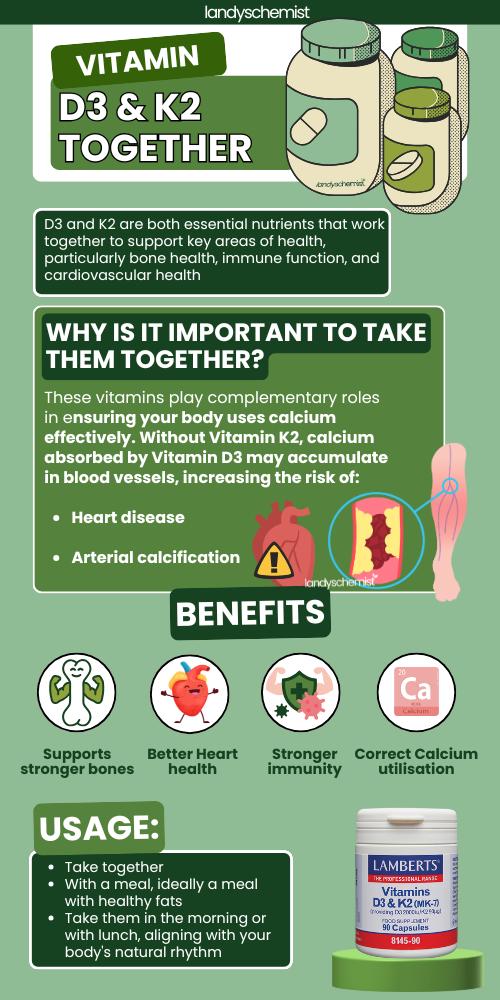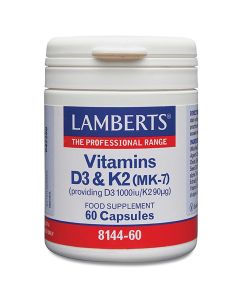
What is vitamin D3 and K2 good for?
Vitamin D3 & K2 | Taking D3 + K2 Together | Health Benefits |
Recommendations | Dosage | Side Effects | FAQ's
Vitamin D3 and K2 are both essential nutrients that work together to support key areas of health, particularly bone health, immune function, and cardiovascular health. These vitamins play complementary roles in ensuring your body uses calcium effectively and maintains optimal levels for overall health. But what are the benefits of taking vitamin D3 and K2 together, and why is this combination particularly beneficial? In this blog, we will explore how these vitamins work together and why they are important for your health.
What are vitamin D3 and K2?
Vitamin D3, also known as cholecalciferol, is the most bioavailable form of vitamin D, meaning it is easily absorbed by the body. It is primarily produced through exposure to sunlight, but it can also be found in fortified foods such as dairy products and cereals or taken as a supplement. Vitamin D3 is essential for calcium absorption in the intestines, playing an important role in bone health, and helping to regulate the immune system. To understand the difference between vitamin D3 and D2 read here.
Vitamin K2, also known as menaquinone-7 (MK-7), although less well-known, is just as crucial for health. It is a fat-soluble vitamin found in fermented foods like natto (fermented soybeans), as well as in animal products such as eggs, liver, and dairy. Vitamin K2 works by activating proteins that help direct calcium to the bones and teeth1, where it is needed, while preventing it from being deposited in soft tissues such as the arteries. This helps to reduce the risk of calcification2 in the blood vessels, which could lead to heart disease and other complications. Read more to learn how Vitamin K2 may prevent osteoporosis and other diseases.
Why should you take D3 and K2 together?
Taking Vitamin D3 and K2 together is essential for ensuring optimal calcium absorption and proper calcium utilisation3 in the body. Vitamin D3 boosts calcium absorption in the digestive tract, ensuring sufficient calcium levels in the bloodstream, while vitamin K2 directs that calcium to the bones and teeth, where it's needed for strength, and prevents it from accumulating in soft tissues, such as the arteries, where it could lead to harmful calcification.
Without Vitamin K2, calcium absorbed by Vitamin D3 may accumulate in blood vessels, increasing the risk of heart disease and arterial calcification. By combining Vitamin D3 and K2, you help regulate calcium distribution in the body, ensuring it strengthens your bones without negatively affecting your cardiovascular health3. This powerful combination supports bone density, heart health, and proper calcium metabolism, reducing the risk of conditions like osteoporosis, heart disease, and calcified arteries.
Why is This Combination Important?
By combining D3 and K2, you create a balance that allows for better utilisation of calcium, promoting overall bone health and reducing the risk of harmful calcium buildup in arteries. Vitamin D3 and K2 are especially beneficial for people going through menopause as they help maintain bone density and heart health, which can be impacted by hormonal changes during this stage, while also supporting calcium regulation to prevent bone loss and arterial calcification.
Vitamin D3 and K2 are especially beneficial for various groups of people, including:
- Older adults: To support bone health and prevent osteoporosis due to reduced calcium absorption.
- Postmenopausal women: To help combat bone loss and reduce the risk of heart disease.
- People with limited sun exposure: To ensure sufficient calcium absorption and support immune function.
- Individuals with cardiovascular conditions: To help regulate calcium deposits and prevent arterial calcification.
- Vegans and vegetarians: As plant-based diets may lack sufficient Vitamin D3 and K2, making supplementation important.
- People with digestive disorders: That affect nutrient absorption, like Celiac disease or Crohn’s disease, as they may require additional support for calcium metabolism.
Health Benefits of taking D3 and K2 together:
Taking Vitamin D3 and K2 together offers several benefits. Here's how these vitamins work together to support overall health:
- Supports Stronger Bones: Vitamin D3 improves calcium absorption, while Vitamin K2 ensures calcium is directed to the bones and teeth, preventing bone loss, osteoporosis, and fractures. This combination is crucial for maintaining bone health throughout life, especially as we age.
- Boosts Cardiovascular Health: Vitamin K2 regulates calcium in the blood vessels, preventing calcium buildup in the arteries. Together with Vitamin D3, they help maintain flexible blood vessels, reduce arterial stiffness, and lower the risk of heart disease4.
- Strengthens the Immune System: Vitamin D3 activates immune cells, enhancing the body’s ability to fight off infections. Vitamin K2 plays a role in immune regulation, ensuring your immune system responds effectively, supporting the body’s defence mechanisms5.
- Improves Calcium Utilisation: Calcium is vital for various bodily functions, but it must be properly utilised. Vitamin D3 promotes calcium absorption, while Vitamin K2 ensures that calcium is directed to the bones and not soft tissues. This combined action improves bone density and helps prevent calcium deposits6 in the arteries and other tissues.
- Supports Healthy Skin: Vitamin D3 is widely known for its role in maintaining skin health, improving conditions like eczema7 and psoriasis8. Vitamin K2 complements this by regulating calcium in the skin. When calcium is not properly directed, it can accumulate in skin tissues9, leading to calcification. This calcium buildup can weaken the skin’s structure, causing stiffness, thickening, often referred to as calcinosis cutis.

How to take vitamin D3 and K2 together
For optimal absorption, Vitamin D3 and K2 should be taken with a meal that contains healthy fats, as both are fat-soluble vitamins. Many prefer a combined Vitamin D3 and K2 supplement for balanced absorption. Always follow the dosage instructions on the supplement label or as advised by your healthcare provider.
Recommended D3 and K2 supplement
Lamberts Vitamin D3 and K2 Capsules offer a safe and effective dosage for supporting bone and cardiovascular health. With 1,000 IU of Vitamin D3 and 90 µg of Vitamin K2 per capsule, this supplement falls within the recommended guidelines for adults, ensuring it provides an optimal, balanced dose. This dosage will promote proper calcium absorption and regulation, without exceeding safe limits. Also available: Lamberts D3 2000iu & 90µg K2 90 capsules
Recommended Dosage for Vitamin D3 and K2
Recommeneded dosages according to NHS Vitamin D3 and K2 guidelines:
For Adults:
- Vitamin D3: 1,000 to 4,000 IU per day (depending on individual needs, lifestyle, and health conditions).
- Vitamin K2: 90-200 mcg daily (recommended intake may vary depending on individual health requirements).
For Children:
- 0 to 12 months: 8.5 to 10 µg of Vitamin D3 daily (typically provided by a Vitamin D supplement).
- 1 to 4 years: 10 µg of Vitamin D3 daily.
- 5 years and older: 10 µg of Vitamin D3 daily.
Vitamin K2 Dosage for Children:
- There is no specific recommended daily intake for Vitamin K2 from the NHS, but typical doses range from 45 to 90 mcg depending on individual health needs and advice from a healthcare provider.
Side effects and considerations
While Vitamin D3 and K2 are generally safe when taken as recommended, it’s important to be aware of potential side effects, particularly when taken in excessive amounts. Here are some key considerations:
- Vitamin D3 Toxicity risk: High doses (over 10,000 IU/day) can lead to symptoms like nausea, vomiting, kidney problems, and high calcium levels. Consult a doctor: If you have kidney disease or any condition affecting calcium metabolism, consult your healthcare provider before supplementing with Vitamin D3.
- Vitamin K2: Vitamin K2 is safe for most people, but high doses may interfere with blood-thinning medications (e.g., warfarin). If you're on blood thinners or have any bleeding disorders, speak to a doctor before taking Vitamin K2 supplements.
Summary
Taking Vitamin D3 and K2 together is a highly effective way to support bone health, cardiovascular health, and immune function. These two vitamins work synergistically to ensure optimal calcium absorption and proper calcium utilisation, helping to maintain strong bones and reduce the risk of conditions like osteoporosis and heart disease. While Vitamin D3 aids in calcium absorption, Vitamin K2 directs that calcium to the bones and teeth, preventing it from accumulating in soft tissues such as the arteries, which can lead to harmful calcification.
If you're looking to enhance your support health, this combination is key for ensuring that calcium is used properly, improving bone density, supporting heart health, and boosting immune function.
FAQ’s
What is the best time to take vitamin D3 and K2?
The best time to take vitamin D3 and K2 is typically with a meal. Taking them in the morning or with lunch is often ideal, as it aligns with your body's natural rhythm and helps avoid potential disruption of sleep if taken later in the day.
Should vitamin D and K2 be taken together or separately?
It’s most effective to take vitamin D3 and K2 together because they work synergistically. Vitamin D3 helps the body absorb calcium, while vitamin K2 ensures the calcium is directed to the bones and not to soft tissues like arteries. When taken together, these vitamins enhance each other's effectiveness and support bone health, heart health, and calcium regulation.
Can you take D3 and K2 on an empty stomach?
While it’s possible to take D3 and K2 on an empty stomach, taking them with food will enhance their absorption. Since both vitamins are fat-soluble, consuming them with a meal ensures better bioavailability, helping the body utilise them more effectively.
What happens if you take vitamin D3 without K2?
Taking vitamin D3 without K2 can potentially lead to improper calcium regulation in the body. Vitamin D3 increases calcium absorption, but without vitamin K2, calcium may be deposited in soft tissues like blood vessels rather than in the bones where it is needed. This can increase the risk of arterial calcification and other health issues. This is why taking D3 and K2 together is recommended for optimal calcium metabolism and health benefits.
References:
- https://pmc.ncbi.nlm.nih.gov/articles/PMC4566462/
- https://pubmed.ncbi.nlm.nih.gov/15514282/
- https://pmc.ncbi.nlm.nih.gov/articles/PMC5613455/
- https://pmc.ncbi.nlm.nih.gov/articles/PMC8596038/
- https://pmc.ncbi.nlm.nih.gov/articles/PMC7406600/
- https://www.sciencedirect.com/science/article/abs/pii/S0378512201002754
- https://bpspubs.onlinelibrary.wiley.com/doi/full/10.1002/prp2.679
- https://pmc.ncbi.nlm.nih.gov/articles/PMC5486909/
- https://pmc.ncbi.nlm.nih.gov/articles/PMC8235376/
This article is for informational purposes only and is not a substitute for medical advice. Consult your doctor or healthcare provider before starting any supplements, treatments, or remedies. Ensure a varied and balanced diet and a healthy lifestyle before considering supplements. Supplements should not replace a balanced diet.







